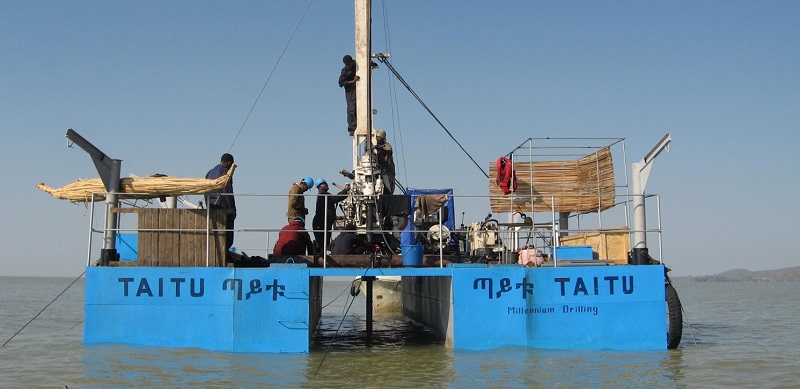A new, long record of African climate supports early dates for Out of Africa

Drilling on Lake Tana – at 93 metre-long the sediment is one of the longest and most complete terrestrial climate records from eastern Africa.
18 January 2018
New research shows that the climate of north east Africa would have favoured migration of early modern humans Out of Africa up to 70,000 years earlier than previous widely accepted estimates.
Led by Professor Henry Lamb from Aberystwyth University, scientists have published a 150,000 year-long climatic record from Ethiopia.
The record shows that environmental conditions would have allowed the increase and expansion of early modern humans from Africa into Asia.
Previous estimates for the time of Out of Africa are based on genetic evidence for dispersal at about 60,000 years ago.
The new record compiled by researchers from Aberystwyth, Bangor and St Andrews universities is derived from a 93 metre-long sediment core drilled from the bed of Lake Tana in northern Ethiopia.
Lake Tana is close to the earliest known fossil sites of Homo sapiens in eastern Africa, and to likely dispersal routes via the Nile valley or across the Red Sea.
As a result, its core record of climate change is highly relevant to current debates about the timing of Out of Africa.
The findings, published on Thursday 18 January 2018 in Scientific Reports, detail geochemical analysis of the core, combined with geophysical imaging of the structure of the sediments below the lake bed.
The core has been dated using luminescence, a technique that identifies when a grain of sand was last exposed to sunlight.
Younger sediments were dated using radiocarbon, making it one of the longest and most complete terrestrial climate records from eastern Africa.
The record shows a long period of moist, resource-rich conditions from about 130,000 to 90,000 years ago.
This favourable environment would have allowed human populations to increase and expand into new territories within and beyond Africa.
Since then, predominantly arid conditions in the region probably restricted human populations to a few moist refuges in the Ethiopian mountains.
Professor Henry Lamb said: “Recent fossil discoveries show earlier human presence in Arabia, China, SE Asia and Australia, putting the date of 60,000 years very much in question.
“The emerging consensus from these discoveries is that there were probably several episodes of dispersal from Africa into Asia, from as early as 130,000 years ago.
“This new record from Ethiopia supports this view by showing that the climate of the time was strongly conducive to the increase and spread of humans from Africa.”
Professor Henry Lamb’s principal research interests are in Quaternary environmental change, specializing in lake-sediment records of climatic and vegetation change.
His primary focus has been on East Africa, especially Ethiopia, working with colleagues from Addis Ababa, St Andrews, Bangor, and Cologne. He is Co-Director of the Itrax XRF core scanner facility.
In 2012 Professor Lamb was a member of the team that extended the accuracy of radio carbon dating from 12,000 to 54,000 years. The work was based on cores extracted from Lake Suigetsu in Japan.
